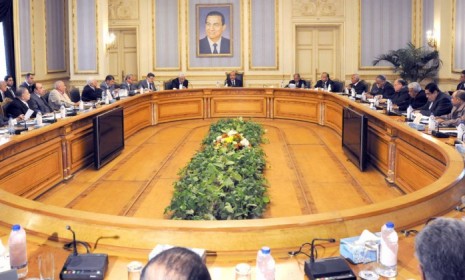Can the Muslim Brotherhood unite Egypt?
The Egyptian government has invited the controversial Muslim Brotherhood to join talks about the nation's future. Is this a sign of where the country is heading?

A free daily email with the biggest news stories of the day – and the best features from TheWeek.com
You are now subscribed
Your newsletter sign-up was successful
In a remarkable shift, the Egyptian government invited the Muslim Brotherhood, a banned Islamist group, to participate in negotiations over the country's future between opposition groups, Egyptian "wise men," and Vice President Omar Suleiman. The Brotherhood agreed Sunday to participate. In reaction, President Obama said that, while the Brotherhood is "well organized," they are just "one faction" and "don't have majority support in Egypt." Will that change now that President Hosni Mubarak's government is opening a door to the controversial group? (Watch The Week's Sunday Talk Show Briefing about the U.S. and Egypt)
We can't risk Islamist rule: This legitimization of the Muslim Brotherhood is a "dangerous turn" in the uprising, says Abe Greenwald in Commentary. The Brotherhood clearly "expects to rule," and the Obama team can't allow that "unacceptable outcome for Americans and democrats in and outside of Egypt." Obama has to use our leverage, making clear that U.S. aid will depend on "the nature and goals of Egypt's next government."
"The Brotherhood makes its move, the U.S. looks on"
The Week
Escape your echo chamber. Get the facts behind the news, plus analysis from multiple perspectives.

Sign up for The Week's Free Newsletters
From our morning news briefing to a weekly Good News Newsletter, get the best of The Week delivered directly to your inbox.
From our morning news briefing to a weekly Good News Newsletter, get the best of The Week delivered directly to your inbox.
The Muslim Brotherhood won't last: "Let me try to offer a dose of reassurance," says Nicholas Kristof in The New York Times. If Egyptians win the right to a fair vote, they will elect some Muslim Brotherhood leaders, along with assorted "demagogues, nationalists, and jingoists." But "partly because of Western anxieties, fundamentalist Muslims have rarely run anything" in Egypt, and they will be voted out once the public sees how "incompetent at governing" they are.
"Militants, women, and Tahrir Sq."
The Brotherhood's future depends on the U.S.: "Egypt is not Iran in a dozen important ways," says Fareed Zakaria in The Washington Post. And the Brotherhood won't hijack the "secular" uprising — yet. But if the U.S. brokers a transition to a Pakistan-like "sham democracy" where the military continues to pull the strings, Egyptians will become "more hard-line, more religious, and more violent." That's when the Brotherhood's "retrograde and pernicious" views might win.
"Egypt's real parallel to Iran's revolution"
A free daily email with the biggest news stories of the day – and the best features from TheWeek.com
-
 The environmental cost of GLP-1s
The environmental cost of GLP-1sThe explainer Producing the drugs is a dirty process
-
 Greenland’s capital becomes ground zero for the country’s diplomatic straits
Greenland’s capital becomes ground zero for the country’s diplomatic straitsIN THE SPOTLIGHT A flurry of new consular activity in Nuuk shows how important Greenland has become to Europeans’ anxiety about American imperialism
-
 ‘This is something that happens all too often’
‘This is something that happens all too often’Instant Opinion Opinion, comment and editorials of the day
-
 The billionaires’ wealth tax: a catastrophe for California?
The billionaires’ wealth tax: a catastrophe for California?Talking Point Peter Thiel and Larry Page preparing to change state residency
-
 Bari Weiss’ ‘60 Minutes’ scandal is about more than one report
Bari Weiss’ ‘60 Minutes’ scandal is about more than one reportIN THE SPOTLIGHT By blocking an approved segment on a controversial prison holding US deportees in El Salvador, the editor-in-chief of CBS News has become the main story
-
 Has Zohran Mamdani shown the Democrats how to win again?
Has Zohran Mamdani shown the Democrats how to win again?Today’s Big Question New York City mayoral election touted as victory for left-wing populists but moderate centrist wins elsewhere present more complex path for Democratic Party
-
 Millions turn out for anti-Trump ‘No Kings’ rallies
Millions turn out for anti-Trump ‘No Kings’ ralliesSpeed Read An estimated 7 million people participated, 2 million more than at the first ‘No Kings’ protest in June
-
 Ghislaine Maxwell: angling for a Trump pardon
Ghislaine Maxwell: angling for a Trump pardonTalking Point Convicted sex trafficker's testimony could shed new light on president's links to Jeffrey Epstein
-
 The last words and final moments of 40 presidents
The last words and final moments of 40 presidentsThe Explainer Some are eloquent quotes worthy of the holders of the highest office in the nation, and others... aren't
-
 The JFK files: the truth at last?
The JFK files: the truth at last?In The Spotlight More than 64,000 previously classified documents relating the 1963 assassination of John F. Kennedy have been released by the Trump administration
-
 'Seriously, not literally': how should the world take Donald Trump?
'Seriously, not literally': how should the world take Donald Trump?Today's big question White House rhetoric and reality look likely to become increasingly blurred